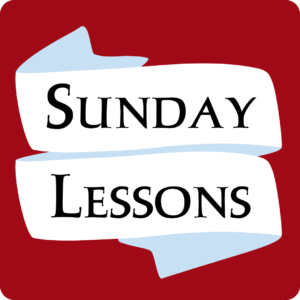Worship Guide for May 18, 2025
Like TV Guide, but from God! Find the text of the Prayers of the People and Sermon below. Use the buttons provided to find other worship materials.
To see the Worship Guide for other weeks, click here.
To see the Book of Common Prayer online, click here.
Prayers
Weekly Prayer List Recording:
Prayers of the People:
Easter 5, 18 May 2025
The response to the bidding, “Lord of new possibility,” is “hear us”
Lord in time and space –In the time in between the resurrection of Jesus as the Christ and the general restoration of the entire creation we wait with patience for the hope that is within us to become a force for good in a world increasingly deaf to the values and expectations of your kingdom. Lord of new possibility, hear us.
We pray for the Church and her life: for Sean, the Presiding Bishop, and Nicholas, our bishop; for Hosam, the Archbishop of Jerusalem; for Pope Leo; for Bartholomew, the Ecumenical Patriarch, and other Christian leaders. Lord of new possibility, hear us.
We pray for the world and its pressing needs: Lamenting changed direction in American foreign policy, we continue to pray for the coming of peace with justice in the Middle East, remembering especially Palestinian communities now subject to militarized policy of ethnic cleansing.
We continue to pray for a negotiated peace in Ukraine that honors a commitment to Ukrainian sovereignty and future self-determination.
For the people of Sudan, Yemen, and Myanmar, for all forced to flee from their homes and homelands by poverty, violence, and war.
We remember communities worldwide adversely affected by the Administration’s cancellation of vital health and social development aid funding. Lord of new possibility, hear us.
We pray for the nation, mindful of so many concerns at this time:
The congregation is invited to bring your concerns for our country to the Lord, either silently or aloud.
Lord, we ask you to bless the Congress and the courts in upholding the integrity of the Constitution. Lord of new possibility, hear us.
We remember the earth, our increasingly fragile island home. We pray for a strengthening of emergency services and necessary infrastructure to meet the challenge of climate instability. Lord of new possibility, hear us.
We pray for all in need and in any trouble: for those whose strength is failing through ill health; whose spirits are flagging through depression; whose determination is being sapped through addiction; that they might know our comforting presence, and your healing. Lord of new possibility, hear us.
We remember with love those who have asked for our solidarity in prayer: Mary, Sam, Benjamin, Jeannette, Shelley, Andrew, and others we name: [pause]. Lord of new possibility, hear us.
We pray for our own needs, together with those nearest and dearest to us, remembering especially those celebrating birthdays this week: Michele Gariepy, Ian MacDonald, Benjamin Edgar, Amy Fuller, Eric Gustafson, Samuel Potter, and Joseleyne Slade. Lord of new possibility, hear us.
Rejoicing in the fellowship of so great a cloud of witnesses, we remember those who have recently died, and others we love but see no longer, especially George Lacouture, and those we name [pause]. We remember everyone coming to terms with the loss of a loved one.
Lord of new possibility, hear us.
Celebrant adds a concluding prayer.
Sermon
The Resurrection Project
The Reverend Mark R. Sutherland
Fifth Sunday of Easter
Year C
Sermon Recording:
I am struck by the fugue-like natures of the themes in the readings for the fifth Sunday after Easter. The Encyclopedia Britannica defines a fugue as a musical composition characterized by systematically imitating a main theme, called the subject, across multiple voices or parts. It typically includes an exposition where the subject is introduced, followed by development sections that explore variations and interactions of the theme.
Working with the fugue metaphor, we hear the central melody in Luke’s account of Peter’s dream—a rich melody introducing a new vision for human community based on radical inclusion. The central theme is further developed in the second reading from the book of Revelation, where it is expanded into the cosmic key of God’s announcement that heaven is to be found on earth. The gospel reading then restates the central melody in the tone of Jesus’ teaching on love as action.
Staying with the musical metaphor, there is a brilliant summation of the melodic interplay I’ve just described in Belinda Carlisle’s legendary 1987 hit single Heaven on Earth:
Ooo, baby, do you know what that’s worth? Heaven is a place on Earth.
They say in heaven, love comes first. We’ll make heaven a place on earth. Ooo, heaven is a place on earth. Lyrics by Rick Nowells and Ellen Shipley
In Surprised by Hope, N.T. (Tom) Wright describes Jesus’ resurrection as the beginning of God’s new project—not to snatch people away from earth into heaven but to colonize earth with the life of heaven. It’s somewhat amusing to find the great Tom Wright channeling Belinda Carlisle.
Christians today, in the main, think that resurrection means spiritual life after death, as in we all will go to heaven to live with God when we die. While liberal Christians have a straightforward inclusive notion of who gets into heaven, basically everyone, conservative Christians still cling to the idea that entry to heaven is conditional on right believing and ritual formulas such as Jesus died for my sins – Jesus as my savior, etc. But both agree on the point of Jesus’ resurrection as a promise of life after death – an announcement of future life with God somewhere else after biological death.
The notion that we leave our bodies behind to ascend as souls to some other place is a deeply anti-Christian idea firmly rooted in Classical Greek thought. The NT does not talk of the separation of body and soul; it speaks of the integration of body and spirit as dual aspects of human experience in the material dimension of time, space, and matter. Belinda croons, “Ooo, baby, do you know what that’s worth?” Heaven is a place on Earth. They say in heaven love comes first. We’ll make heaven a place on earth. Ooo, heaven is a place on earth.
Christians need to understand Jesus’ resurrection, not as an individual event, something that happened only to him, but as the first fruits, the inauguration of a project of changing the world, redirecting our attention away from pie in the sky when we die back to the current state of life on earth.
The concept of our souls’ future fulfilment requiring the jettisoning of our bodies invites us to care more about the life to come than the life to be lived now. Christians who are most focused on their destination in heaven are likely to neglect the duty to leave the world in a better state than the one they came into.
Resurrection as an internal, individualized, spiritual experience of future fulfilment breaks the continuity linking the resurrection of Jesus to the ultimate resurrection of the whole of creation.
Through the Hebrew prophets, God continually affirmed the goal of the resurrection project, as nothing short of the remaking of heaven on earth. It’s only within the continuity of this promise for the whole creation that the resurrection of Jesus on Easter Day makes any sense.
Revelation’s melodic expansion – See! the home of God is among mortals … see I am making all things new – is a further development of Luke’s central theme of radical inclusion before the gospel’s final restatement in Jesus’ teaching on love as the engine for transformation.
Tom Wright speaks of Jesus’ resurrection as a foretaste of the future brought into real time, God’s promise of the kind of future we should anticipate in the present. Anticipating the future—now, there’s a challenge. Because the shape of the future does not arrive preformed of its own accord. Our anticipation today shapes the kind of future that will arrive through the actions we take or fail to take now.
The radical vision of an inclusive community is where the home of God is to be found. The struggle within human communities to translate love into justice is where the power of remaking a new heaven on earth can be seen. As Christians, we do not look forward to a future heaven for the righting of all wrongs and the wiping away of every tear. We grasp the challenges of working towards these goals today by
-
- loving as we are loved
-
- behaving towards others as we expect to be treated
-
- agitating for human dignity as a foundational right for everyone, and not something to be dictated or denied by the exercise of power.
The radical vision of the home of God at the heart of the human community is centered on the cherishing and protection of human dignity. In Dignitas Infinita, the late Pope Francis laid out the four aspects of human dignity.
-
- Ontological dignity – the dignity of being made in the image of God, loved and cherished by God as a reflection of the divine nature.
-
- Moral dignity – the exercise of freedom and fidelity to the dictate of conscience – not only a requirement for right action but also for right motivation and intention
-
- Social dignity—the means to prosper in a society that affords the social, economic, and environmental protections necessary for sustainable living with dignity.
-
- Existential dignity involves combating serious illnesses, domestic violence, gender and racial scapegoating, pathological addictions and their social causes, and other hardships that debase a person’s ontological dignity. Existential dignity also affects those who may enjoy the material prosperity considered essential for a dignified life, yet struggle to live with hope and the experience of joy in their hearts.
What God has made clean, who are we to call profane? Who are we to reject and exclude those whom God has included through the Holy Spirit’s outpouring? For see the home of God is to be found not in heaven but here among us, where through loving action we support God’s reign of justice. When love is realized through action, justice becomes its name.
Or as Belinda Carlisle croons: Ooo, baby, do you know what that’s worth? Ooo, heaven is a place on earth. They say in heaven, love comes first. We’ll make heaven a place on earth, Ooo, heaven is a place on earth..





